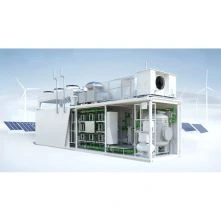Get A Quote
BIS Certification for Electrolysers IS 302 (Part 1): 2024

The BIS Certification for Electrolysers guarantees adherence to Indian safety and quality standards, confirming that electrolysis equipment fulfills all pertinent regulatory requirements. This certification is essential for manufacturers, assuring that their products are safe, dependable, and appropriate for various industrial applications.
By securing BIS Certification for Electrolysers, companies can showcase their dedication to quality, boost product credibility, and ease entry into the Indian market. Additionally, it provides customers with confidence in the product's performance, reliability, and safety under the Bureau of Indian Standards.
The BIS Certification for Electrolysers, governed by the Safety of Household, Commercial, and Similar Electrical Appliances (Quality Control) Order, 2024, guarantees that electrolysers adhere to mandated safety and quality standards designed to protect consumers. The certification process encompasses rigorous testing to ensure that these appliances are safe, efficient, and reliable for both household and commercial use. By achieving compliance with the BIS QCO, manufacturers can affirm their dedication to quality and safety. Pursuing BIS Certification for Electrolysers enables businesses to uphold regulatory compliance while fostering consumer confidence in their products.
Why is BIS Certification Necessary for Electrolysers IS 302 (Part 1): 2024?
BIS Certification
for electrolysers is vital in ensuring product quality, safety, and compliance
with Indian standards. The IS 302 (Part 1): 2024 standard outlines the
guidelines for the design, construction, and performance of electrolysers
utilized across various industrial applications. Securing BIS certification for
electrolysers signifies a commitment to safety regulations and environmental
standards, cultivating trust between consumers and manufacturers. This
certification is essential for market access, confirming that products fulfill
regulatory requirements while providing a competitive advantage in the industry
alongside maintaining high reliability and performance standards.
Overview of Indian Standard IS 302 (Part 1): 2024
The Indian Standard IS 302 (Part 1): 2024
is a vital benchmark for the safety and operational efficiency of
electrolysers. It delineates the specifications for the design, testing, and quality
assurance of electrolysers utilized in diverse applications, such as hydrogen
generation and water purification. This standard guarantees that these devices
adhere to elevated safety norms and function effectively, mitigating risks
while fostering sustainability. BIS Certification for electrolysers is
imperative for manufacturers to validate their adherence to these rigorous
guidelines, thereby ensuring the reliability and safety of their products in
the Indian marketplace. This certification enables businesses to comply with
regulatory mandates and industry benchmarks.
Process for BIS Certification
The BIS
certification process for BIS certification for Electrolysers involves multiple
steps designed to thoroughly evaluate a product's compliance with the required
standards. Here is a general overview of the certification process:
1. Application
Submission: Manufacturers must submit an application form along with the
required documentation to BIS.
2. Documentation
Review: BIS reviews the submitted documents to ensure completeness and
correctness.
3. Factory
Inspection: BIS officials conduct an on-site inspection of the manufacturing
facility to assess the production process and quality control measures.
4. Sample Testing:
Product samples are taken and tested in BIS-approved laboratories to verify
compliance with Indian standards.
5. Certification
Grant: Upon successful completion of the inspection and testing, BIS grants
certification, allowing the manufacturer to use the BIS mark on their products.
Documents Required for BIS Certification
To apply for BIS certification, manufacturers need to submit the following documents:
● Application form
● Manufacturing process details
● Quality control plan
● Test reports from BIS-approved laboratories
● Factory layout and equipment details
● Proof of business registration
● Product specifications and technical details
● Declaration of conformity to Indian standards
Additionally, manufacturers may be required to provide proof of compliance with environmental and safety regulations, depending on the specific type of product being certified.
BIS ISI Mark Certification Costing And Timeline
To Know The Process in Detail, Please Visit:
Under BIS Registration Products ISI and CRS
Conclusion
Obtaining BIS Certification for
electrolysers is crucial for manufacturers in India to guarantee that their
products adhere to the highest safety and quality standards. Leveraging our
expertise in the BIS certification process, EVTL India offers comprehensive
consultancy services to facilitate efficient compliance for businesses. Our
team ensures that your electrolysers align with all requisite standards,
thereby elevating product credibility and enhancing market acceptance. EVTL
India excels in offering specialized consultancy services that assist
businesses in effectively navigating the BIS certification process. Our expert
team ensures that all required documentation is meticulously prepared and that
products comply with the necessary standards, facilitating a seamless
certification experience. By capitalizing on our extensive knowledge,
businesses can confidently obtain the needed approvals, thereby ensuring both
compliance and excellence in quality. Rely on EVTL India for professional
guidance in securing BIS Certification for electrolysers, promoting regulatory
adherence, and fostering business growth.
Free Call Back
Latest News & Update
📅 BIS Critical Component List (CCL) Updates for Solar PV Modules
🕒 BIS Fee Concessions for MSMEs and Startups | EVTL India
📅 Guidelines for Implementation of Essential Requirements for Security of CCTV
🕒 Omnibus Technical Regulation (OTR) Amendment Order, 2025
🕒 Extension of Timeline for Filing Annual Returns by Battery Producers
📅 Extension of Timeline for Filing Quarterly and Annual Returns for E-Waste
🕒 Extension of Concurrent Running Period for IS 302-1: 2008 and IS 302 (Part 1): 2024
🕒 BIS Guidelines for Grant of Licence (GoL) | EVTL India
📅 CPCB Guidance on filing of Application, Fees and more
🕒 CPCB Notification on Labelling of Plastic Packaging
📅 Mandatory Compliance for Input Materials of Steel and Steel Products for Imports
🕒 BIS Guidelines for Scheme-X Certification for OTR-Regulated Products
📅 BIS Upgrades Product Certification License Numbers to 10-Digit Series
🕒 BIS Certification No Longer Mandatory for 14 Chemical & Polymer Categories
Why Choose EVTL INDIA
Expertise in Indian Regulatory Standards
End-to-End Support
Trusted by Top Indian & Global Brands
Fast Processing & Transparent Pricing
Strong Liaison with Indian Authorities
Company Profile














